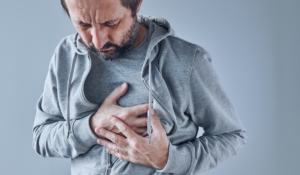
Cardiac arrest and heart attacks are both extremely dangerous conditions that require immediate medical attention. Many people confuse the two and use the terms interchangeably, but they are not the same. The American Heart Association describes cardiac arrest as an “electrical problem”, and a heart attack as a “circulation problem”.
Cardiac arrest is an electrical malfunction that disrupts the heart’s pumping action, causing the heart to suddenly stop beating. This limits blood flow to the brain and other organs, which can lead to fainting, leave a person disabled, or become fatal if not treated immediately. Symptoms of cardiac arrest include:
- Loss of consciousness
- Gasping or person ceases breathing
- No pulse
Abnormal heart rhythms (arrhythmias), congenital heart defects, coronary heart disease, and blunt chest trauma can all cause a person to go into cardiac arrest. Time is crucial when treating someone experiencing cardiac arrest. If someone is suffering from cardiac arrest, CPR should be the first line of treatment. When emergency personnel arrive, they will use a defibrillator to send an electric shock to the heart to get it pumping again.
The Link between Cardiac Arrest and Heart Attacks
Heart attacks occur when a blockage or clog prevent blood flow to the heart muscle. Heart attacks are very common, with over 3 million cases occurring in the U.S. each year. In some cases, cardiac arrest is the first symptom of a heart attack.
Symptoms of a heart attack vary. Women are more likely to experience fatigue, difficulty breathing, nausea, and pain in their arms, abdomen, backs, shoulders, and neck. Men commonly experience chest pain (angina) and indigestion.
Heart attack survivors are at an increased risk of suffering from cardiac arrest. Heart attacks, or residual scar tissue from a previous heart attack can trigger ventricular fibrillation, a type of abnormal heart rhythm, which can lead to cardiac arrest.
Heart attacks and sudden cardiac arrest are two distinct heart conditions that can lead to death. Heart attacks can lead to cardiac arrest at the onset or in recovery. Heart attacks are a common cause of cardiac arrest, but cardiac arrest can also occur due to other causes.
Recovery from a heart attack and cardiac arrest depends on the immediate care provided. The probability of meaningful survival is improved with fast, appropriate medical care.
Prevention of heart attack and cardiac arrest is the best way to protect against these deadly medical conditions. Regular screenings with your doctor and early detection of heart disease or other conditions that affect the heart can help lower your risk of a heart attack or cardiac arrest.
Road to Recovery
After a heart attack, it’s important to adopt healthy lifestyle habits as soon as possible to decrease the likelihood of a second attack. Diet, exercise and smoking cessation are important first steps. Your healthcare team will develop a recovery plan that may include starting medication to help prevent another heart attack.
The outlook and recovery time for someone who has experienced cardiac arrest is dependent on how quickly their heart was resuscitated, and how healthy the individual was during the event. If a person was in overall good health, and did not suffer any injury or broken bones when receiving CPR, they may experience a shorter recovery time.
The quicker you act in the event of cardiac arrest or a heart attack, the better your survival rate will be. Regular screenings with your doctor and early detection of heart disease or other conditions that affect the heart can help lower your risk of a heart attack of cardiac arrest.
Schedule a Visit with Dr. Madhusudanan

Dr. Mohan Madhusudanan is a board-certified doctor who specializes in cardiology, nuclear cardiology, cardiovascular CT, echocardiography, and RVPI. Dr. Madhusudanan sees patients at 3091 William St in Cheektowaga, NY.To schedule an appointment with Dr. Madhusudanan, call (716) 822-3098.


